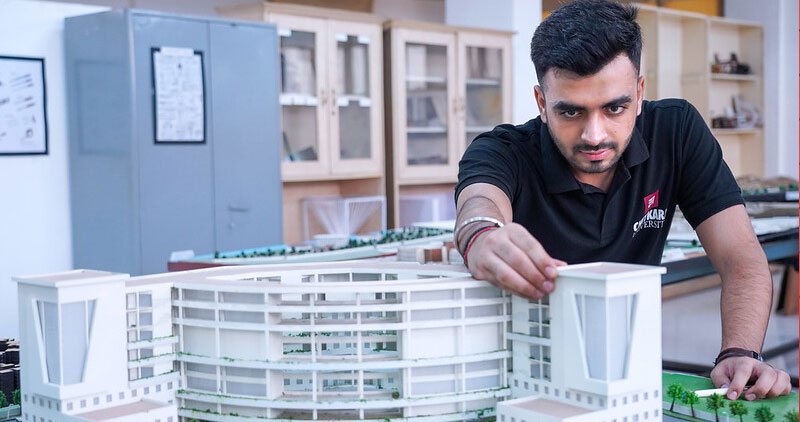Doctoral Program in
Architecture
The PhD. Program in Architecture at Chitkara University is focused on the production of knowledge in the historical, theoretical, or technological development of architecture, landscape architecture, and historic preservation. Operating within the context of a design school in a university setting, it is a fundamentally interdisciplinary program, and seeks to explore opportunities in the wider university to reconsider the terms, methods, and futures of architectural knowledge.
Furthermore, the PhD. in Architecture addresses the development of modern architectural form and ideas as they have been affected by social, economic, and technological change. In broad terms, it encompasses the relations between the profession, practice, civil institutions, and the society at large.

Program Overview
PhD. studies are a natural springboard for academic positions. The majority of the graduates from our programs have gone on to academic careers both in India and internationally, often making quick promotion to leadership positions. The training to do independent work, to think abstractly, and to handle technical literature has also provided a strong general foundation for some graduates to find work in areas beyond architecture.
In addition, it is in the nature of research in any field to be at the cutting-edge of disciplinary development. The graduates of a research program should, therefore, expect come away not just with competence in a subject matter and ability to solve problems, but also the knowledge and ability to think of ways to advance ideas, techniques, and methods in their discipline. This is a remarkably fortuitous time to those who seeks to do just this in architecture.
Recent developments in computational technology, in our ability to collect vast amount of behavioral and user data, in techniques of machine learning and data analysis, and in our ability to design and build highly complex forms using automated algorithmic processes, are not only creating an unprecedented appetite for research within architecture, but they are also erasing traditional sub-disciplinary boundaries between different areas of work. Beyond career opportunities, therefore, ambitious graduates of the program will also find themselves well positioned to make foundational contributions to a discipline that is in an excitingly formative stage.
Admission Eligibility
The candidates must have obtained the following qualification, passing from any of the universities incorporated by an Act of the central or state legislature in India or other educational institutions established by an act of parliament or declared to be deemed as a university under Section 3 of the UGC Act, 1956, or possess an equivalent qualification recognized by the Ministry of HRD, Government of India, or equivalent qualification from an institution approved by AICTE.
A Master’s degree or its equivalent in relevant discipline with minimum 55% aggregate marks (relaxation for reserved categories as per UGC norms).
How to Apply
Candidates who fulfil the eligibility criteria, are required to fill the admission form with evidences of all particulars to be attached. All application forms will be screened by a separate screening committee whose representatives will be from Doctoral Research Committee and Experts from the University in the respective areas. The candidates short-listed on the basis of their academic record and relevant experience will appear in a written test to be conducted by the University. Time-table & Curriculum will be intimated to the registered candidates. The candidates will then appear for a personal interview for the final selection.
Get in touch with us

Program Fee
| Fee Components | Amount |
|---|---|
| Enrolment Fee | Rs. 50,000/- |
| Course Work Fee 1 | Rs. 25,000/- |
| Course Work Fee 2 | Rs. 25,000/- |
| Course Work Fee 3 | Rs. 25,000/- |
| Doctoral Seminar on Specialisation | Rs. 60,000/- |
| Synopsis Seminar Fee | Rs. 60,000/- |
| Progress Review Seminar 1 | Rs. 20,000/- |
| Progress Review Seminar 2 | Rs. 20,000/- |
| Progress Review Seminar 3 | Rs. 20,000/- |
| Pre-Thesis Submission | Rs. 40,000/- |
| Thesis Submission & Defence Fee | Rs. 75,000/- |
| Total | Rs. 4,20,000/- |
Program Structure
The curriculum includes compulsory coursework, research proposal and objectives, research work and progress, pre-thesis work, and thesis defense. It also includes fulfillment of all research objectives, acceptance/publication of research papers in peer-reviewed journals or conferences.
The course work comprises of five components: research methodology, advanced research methodology, doctoral foundation seminar, doctoral concentration seminar, and research & publication ethics. After successfully completing coursework, the research scholar works in close coordination and under the strict supervision of his / her research guide, prepares the research proposal, and identifies the objectives of the research work.
Progress of the research work is reviewed every six months and finally, the scholars submit their thesis and defend it. The Doctoral Research Committee (DRC) closely mentors and monitors this process.

| Phase | Sub components | Outcome |
|---|---|---|
| Course Work | Research Methodology | Enabling scholars to purse research in a methodical manner |
| Advanced Research Methodology | Enabling scholars to know about tools and technologies to process their data | |
| Doctoral Foundation Seminar | Enabling and equipping scholars with required tools and technologies in their broad discipline area | |
| Doctoral Concentration Seminar | a) Motivation to Research, b) identification of base paper(s), c) State-of-art, d) Identification of research gaps, e) Identification of Tools/ technologies for conducting proposed research | |
| Research & Publication Ethics | Sensitization towards research, Ehics and respect to science and research integrity, Intellectual honesty and research integrity, Scientific misconducts, Falsification, Fabrication and Plagiarism | |
| Submission of Research Proposal | Extensive literature review / research proposal submitted to Dean (DRC) in prescribed format | |
| Progress Seminar – I | Progress on identified research objectives | |
| Progress Seminar – II | Progress on identified research objectives | |
| Progress Seminar – III | Progress on identified research objectives | |
| Pre Thesis Seminar | Achievement of all objectives, Thesis ready in final shape, Research paper(s) communicated to Conferences / Journals | |
| Thesis Submission and defense | Eligibility for award of PhD. degree |
What to Expect
The PhD. program at Chitkara University will prepare you for an outstanding career in research and teaching. Right from your first semester, you’ll get to work with faculty mentors across your field as you investigate the challenges that interest you. Our doctoral program students have the ability—and diligence—to study complex issues that the world right now faces.
-


Developing Transferrable Skills for Non-Academic Careers
Our Ph.D Program is strategically designed to cater to the needs of high-achieving professionals aiming to enhance their career in the world beyond academia as well. While conventional academic skills are often developed through courses and mentoring, we also incorporate various pedagogical approaches to mentor them as leaders, entrepreneurs, etc., equipping them with numerous transferable skills, thus grooming them for successful careers in the industry.
-


Opportunities to Present Papers at Prominent Conferences
Our PhD. students get the opportunity to present their work at prominent conferences. Such conferences, we believe, provide a platform to present one’s research to a global and important audience of scholars and experts in the field. Resultantly, our scholars are ahead at knowing about latest developments as well as open issues that the research community is collectively deliberating upon.
-


Student Support
Our faculty closely works with research scholars on all phases of the research process—from idea generation and study design to data analysis and writing. The culture is collegial and informal, with students viewed as colleagues and co-authors. Moreover, students are encouraged to work with multiple faculty, which helps them widen their perspective on contemporary issues in their field.
-


Collaborative Research Environment
In our PhD. Program one finds the most conducive environment to work in collaboration with other scholars, teachers and ace researchers. Our ideology is simple - collaborative teams exhibit important research outcomes, far beyond what could be accomplished by individuals working independently.
Concentrations Offered
Framework for PhD Program









